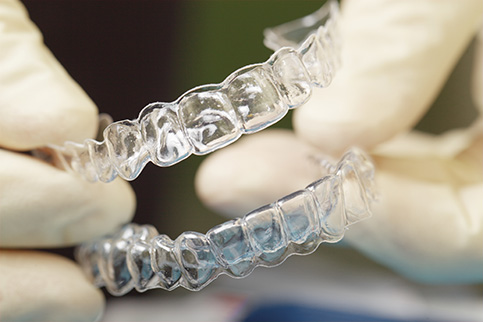Popular Cosmetic Dentistry Treatments
-

Cosmetic dentistry is more popular than ever, with more and more people looking for ways to improve or restore the appearance of their smiles. According to the American Academy of Cosmetic Dentistry, a staggering 99.7 percent of adults view a smile as an important social asset, with 74 percent believing that an unattractive smile has the potential to inhibit career success. In some cases today’s cosmetic dental treatments also have a restorative component.
Here are seven of the most popular cosmetic dentistry treatments performed today:
-
Teeth Whitening

Whitening (or bleaching) is the most popular cosmetic dentistry treatment. The ease of access and relative low cost make it a very attractive option for people looking to improve smile esthetics without undergoing anything too invasive. The best results are typically achieved through in-office professional whitening treatment, though there are a number of dentist-dispensed take home whiteners that let you do it yourself.
Depending on the particular variety of teeth whitening treatment you opt for, you may be able to lighten teeth color by two to nine shades. Results are temporary, lasting several months (depending on how well you care for your teeth).
Cost: The cost of whitening varies significantly from treatment to treatment and brand to brand. However professional teeth whitening costs approximately $650 per visit, compared to a range of $100 to $400 for professionally dispensed do-it-yourself kits. Over-the-counter solutions like strips are considerably less expensive and correspondingly less effective.
-
Porcelain Veneers

For those for whom teeth whitening is not an option — be it due to stubborn intrinsic tooth staining or some other functional concern — porcelain veneers may be the answer. A porcelain shell is fabricated to fit over a prepared tooth to correct worn enamel, uneven alignment/spacing, chips/cracks, and/or discoloration.
If you’re unhappy with your teeth and are looking to manufacture the perfect smile, porcelain veneers offer an excellent solution. However, keep in mind that unlike whitening, veneer application is an invasive procedure that requires the permanent alteration of your natural teeth.
Cost: The cost of porcelain veneers is impacted by a variety of factors, though you can estimate having to spend roughly $925 to $2,500 per tooth. And that’s not a permanent fix. Traditional porcelain veneers last on average between 10 to 15 years.
-
Invisible Braces

For those looking for an orthodontic solution without a mouth full of wire and bracket braces, consider invisible braces. There are a number of invisible braces variants, including ceramic tooth-colored brackets, inside braces (placed on the back of teeth) or clear aligners (like Invisalign or ClearCorrect). The various types are not necessarily interchangeable and must be evaluated on a case by case basis.
Cost: The cost of invisible braces varies from case to case, product to product. Inside braces cost will be similar to that of traditional braces ($3,000 to $7,000), but ceramic braces and clear aligners may end up being slightly more expensive (though in the same ballpark).
-
Gingival Contouring

A common smile concern many people share is gummy smile, in which an excessive amount of gum tissue is exposed when smiling. Also called excessive gingival display, gummy smile is treatable in a variety of ways, including laser treatment, surgical lip repositioning, orthodontics, maxillofacial surgery and gingival sculpting. Gingival contouring treatments often are performed by specialists such as periodontists, orthodontists or in some cases an oral surgeon.
Cost: The cost of gingival contouring is difficult to estimate given the many variables at play. The best way to get an estimate for the cost of treatment is to speak with a qualified dentist.
-
Direct Composite Bonding

Although it’s not the most glamorous of the cosmetic dentistry treatments, bonding is nonetheless popular, much more so than some of the more elaborate procedures. In dentistry, bonding describes the process of permanently attaching to the teeth dental materials such as fillings, crowns and veneers. Direct composite bonding is also used to repair chips, cracks and small gaps with tooth-colored composites, serving as a simple, cheap esthetic solution to a host of dental concerns.
Cost: The cost of bonding will be determined based on the specific type of bonding you undergo and whether it is part of another procedure, like veneers. On average, the per-tooth cost of dental bonding ranges from $300 to $600. Speak with a qualified dentist to get a more custom-tailored cost estimate.
-
Porcelain Crowns

Also referred to as “caps,” crowns help to preserve the functionality of damaged teeth. In this sense crowns straddle the line between restorative and cosmetic. Crown materials can be gold, porcelain fused to metal, or all-ceramic porcelain; the last of which offers the highest degree of esthetic value. Porcelain crowns boast a reduced thickness that maintains durability while allowing increased light transmission through the crown for a natural, tooth-like appearance. Although durable, the all-ceramic porcelain variety of crowns may not be advisable for certain areas of the mouth that require heavy function (such as molars).
Cost: On average, the cost of porcelain crowns ranges from $1,000 to $3,500 per tooth. Like porcelain veneers, these crowns offer an average lifespan of 10 to 15 years.
-
Implants

Dental implants are the crème de la crème of restorative and cosmetic dentistry, providing the highest level of strength and durability with natural tooth-like esthetics. A permanent solution to tooth loss, implants consist of an artificial tooth root (typically titanium) that is surgically implanted in the jaw, where it fuses to the bone in a process known as osseointegration. This is the source of the unparalleled durability associated with implants. A crown is attached on top of the implant to serve as the actual tooth replacement. The procedure is invasive and requires a six-month recovery period before the crown can be placed and the procedure finalized.
Cost: Dental implants cost on average between $900 and $3,000 per tooth, though costs can vary significantly on a case by case basis. The added benefit of dental implants is their longevity. In most cases, a dental implant should last you the rest of your life (assuming you receive them in your 30s or 40s). However, the crown atop the implant may need to be replaced after 10 to 15 years.









